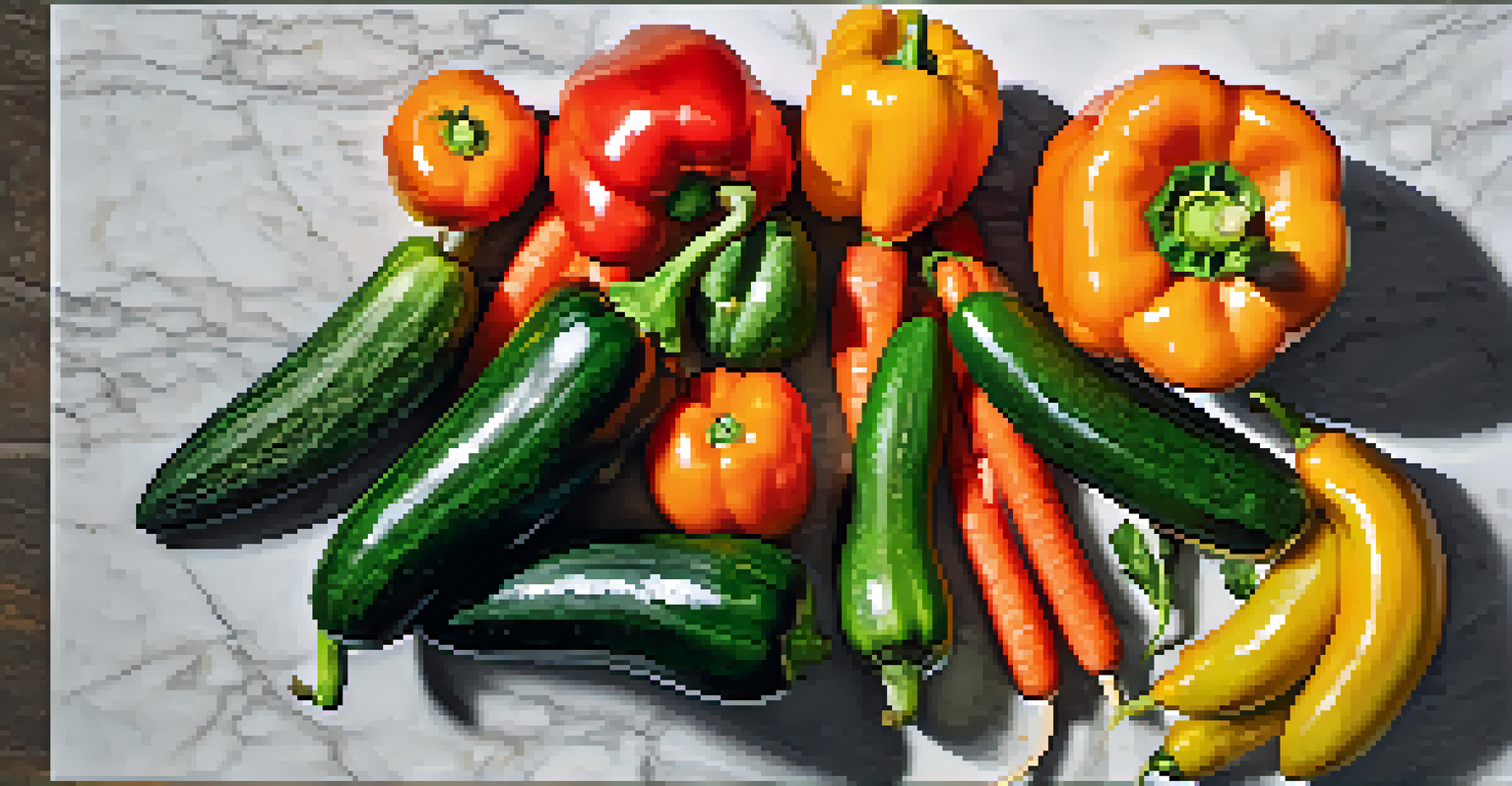Essential Nutrients in a Raw Vegetarian Diet: A Detailed Look

Understanding Raw Vegetarianism and Its Benefits
Raw vegetarianism focuses on consuming uncooked plant-based foods, which can offer numerous health benefits. Many people choose this lifestyle for its potential to improve digestion and boost energy levels. By prioritizing whole foods like fruits, vegetables, nuts, and seeds, individuals often experience a more vibrant and health-conscious lifestyle.
Let food be thy medicine and medicine be thy food.
Moreover, raw vegetarian diets are typically rich in antioxidants, which help combat oxidative stress in the body. These foods are also low in processed sugars and unhealthy fats, making them a heart-healthy choice. As a result, adopting a raw vegetarian diet can lead to better overall health and well-being.
However, it's essential to ensure that this diet includes all necessary nutrients to maintain optimal health. While the focus on raw foods is beneficial, understanding the nutritional needs is crucial for long-term sustainability.
Key Nutrients to Consider in a Raw Vegetarian Diet
A well-balanced raw vegetarian diet should include a variety of essential nutrients, such as protein, vitamins, and minerals. Key nutrients like vitamin B12, iron, and calcium can be more challenging to obtain from raw plant sources, making it crucial to plan meals carefully. Understanding these nutritional needs helps ensure that the diet remains balanced and nourishing.

Protein is especially important for muscle repair and overall body function, and can be sourced from nuts, seeds, and legumes. On the other hand, vitamin B12, primarily found in animal products, may require supplementation or fortified foods for those following a strict raw vegetarian diet. This highlights the importance of being proactive about nutrient intake.
Raw Vegetarianism Boosts Health
Raw vegetarianism emphasizes uncooked, plant-based foods that are rich in nutrients and antioxidants, promoting improved digestion and overall vitality.
Focusing on a diverse range of foods can help cover most nutrient bases. Incorporating a variety of fruits, vegetables, nuts, and seeds while being mindful of potential deficiencies is the key to thriving on this diet.
The Importance of Protein in a Raw Vegetarian Diet
Protein plays a vital role in building and repairing tissues, as well as producing enzymes and hormones. For those on a raw vegetarian diet, it's essential to find adequate protein sources, as traditional animal proteins are off the table. Thankfully, there are plenty of plant-based options available, including nuts, seeds, and sprouted legumes.
The food you eat can be either the safest and most powerful form of medicine or the slowest form of poison.
For instance, hemp seeds and chia seeds are excellent sources of protein, offering a complete amino acid profile. Additionally, incorporating spirulina or other algae can provide a protein boost while adding essential micronutrients. The key is to mix and match different sources to ensure a well-rounded protein intake.
It's also important to remember that protein needs vary based on factors like age, activity level, and overall health. Keeping an eye on protein consumption can help maintain muscle mass, especially for those leading an active lifestyle.
Essential Vitamins: B12 and Others in Raw Vegetarianism
Vitamin B12 is often referred to as the 'energy vitamin' because it plays a crucial role in energy production and brain health. Unfortunately, this vitamin is primarily found in animal products, making it a potential concern for raw vegetarians. To avoid deficiency, individuals may need to consider fortified foods or supplements.
Besides B12, other vitamins such as A, C, and E are abundant in raw fruits and vegetables. These vitamins are essential for skin health, immune function, and overall cellular repair. Eating a colorful array of produce can help ensure adequate intake of these vital nutrients.
Key Nutrients Are Essential
A balanced raw vegetarian diet must include essential nutrients like protein, vitamin B12, calcium, and iron to maintain optimal health.
Additionally, being aware of vitamin D levels is important, especially for those who may not get enough sunlight. Foods like mushrooms exposed to UV light can be a good vegan source of vitamin D. Monitoring these essential vitamins helps keep the body functioning optimally.
Minerals: Calcium, Iron, and Zinc in Raw Vegetarian Diets
Minerals such as calcium, iron, and zinc are crucial for various bodily functions, yet they can be trickier to obtain in a raw vegetarian diet. Calcium, for instance, is essential for strong bones and teeth, and while dairy is a common source, raw vegans can turn to leafy greens, almonds, and tahini. This variety helps ensure that calcium needs are met.
Iron is another critical mineral, as it supports oxygen transport in the blood. While red meat is famously rich in iron, raw vegetarians can find plant-based sources like lentils, quinoa, and pumpkin seeds. Pairing these iron-rich foods with vitamin C sources, like bell peppers or citrus fruits, can enhance iron absorption.
Zinc, important for immune function and cell repair, can be found in nuts, seeds, and whole grains. By diversifying food choices and paying attention to mineral intake, raw vegetarians can effectively meet their nutritional needs.
Healthy Fats: Omega-3 and Omega-6 Fatty Acids
Healthy fats are essential for brain health and hormone production, but they can sometimes be overlooked in a raw vegetarian diet. Omega-3 and omega-6 fatty acids are particularly important, as they contribute to heart health and reduce inflammation. Raw sources of omega-3s include flaxseeds, chia seeds, and walnuts, making them easy to incorporate into meals.
Omega-6 fatty acids are also crucial, found in oils like hemp and sunflower seed oil. Striking a balance between omega-3 and omega-6 intake is important for overall health, as too much omega-6 can lead to inflammation. Hence, including a variety of these healthy fats in the diet is key.
Hydration Supports Well-Being
The high water content in fruits and vegetables within a raw vegetarian diet aids in hydration, which is vital for digestion and overall bodily functions.
Additionally, remember that fats can enhance the absorption of fat-soluble vitamins like A, D, E, and K. So, adding a drizzle of olive oil or a handful of nuts to salads not only boosts flavor but also aids nutrient absorption.
Hydration and Its Role in a Raw Vegetarian Diet
Staying hydrated is crucial for overall health, and a raw vegetarian diet can naturally lend itself to better hydration. Many fruits and vegetables have high water content, which helps keep the body hydrated. Foods like cucumbers, watermelon, and oranges are not only refreshing but also serve as excellent hydration sources.
In addition to consuming hydrating foods, it's important to drink enough water throughout the day. Proper hydration supports bodily functions like digestion, nutrient absorption, and temperature regulation. Keeping a water bottle handy can make it easier to stay on track with daily fluid intake.

Moreover, herbal teas and infused waters can add variety to hydration routines. By being mindful of both food and fluid intake, individuals on a raw vegetarian diet can ensure they remain well-hydrated and healthy.